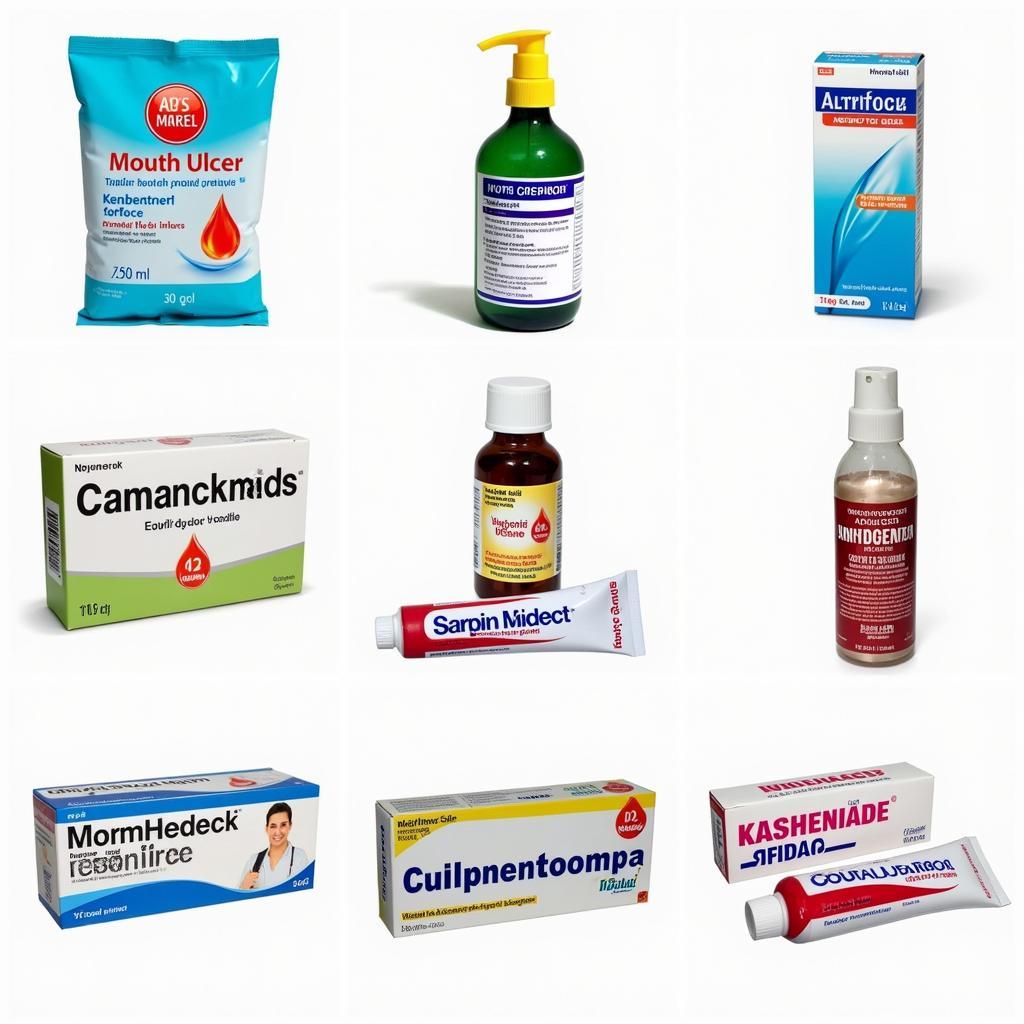Mouth ulcers, also known as canker sores, are a common ailment in Pakistan and around the world. These small, painful lesions can appear on the tongue, inner cheeks, gums, and even the roof of the mouth, causing discomfort and disrupting daily life. This article explores the causes, symptoms, and effective Mouth Ulcer Medicine In Pakistan, providing you with the knowledge to find relief and healing.
Understanding Mouth Ulcers: Causes and Symptoms
While the exact cause of mouth ulcers can vary, common triggers include stress, hormonal changes, vitamin deficiencies (particularly B12 and iron), food sensitivities, and even minor injuries from biting the cheek or tongue. These triggers often weaken the mouth’s lining, making it susceptible to inflammation and ulcer formation.
Recognizing the symptoms is crucial for prompt treatment. These include:
- Small, round, or oval sores with a white or yellowish center and a red border
- Pain or burning sensation, especially when eating or drinking
- Tingling or numbness around the ulcer
- Difficulty speaking or swallowing in severe cases
Exploring Mouth Ulcer Medicine in Pakistan
Pakistan offers a range of effective over-the-counter and prescription medications for mouth ulcers. These medicines aim to alleviate pain, reduce inflammation, promote healing, and prevent infection. Some widely available options include:
1. Antiseptic Mouthwashes and Gels:
Antiseptic solutions like chlorhexidine and povidone-iodine are available as mouthwashes and gels. They help kill bacteria in the mouth, reducing the risk of infection and promoting a clean healing environment.
2. Topical Analgesics:
These medications provide pain relief by numbing the affected area. Look for gels or ointments containing benzocaine, lidocaine, or choline salicylate. Apply these directly to the ulcers for temporary pain relief.
3. Corticosteroids:
Topical corticosteroids like triamcinolone and fluocinonide help reduce inflammation and speed up healing. They are available as gels, ointments, or oral pastes. Consult a doctor or pharmacist for the appropriate dosage and duration.
4. Oral Medications:
In some cases, doctors may prescribe oral medications for severe or recurrent mouth ulcers. These may include:
- Pain relievers: Over-the-counter painkillers like ibuprofen or paracetamol can help manage pain and discomfort.
- Anti-inflammatory drugs: Non-steroidal anti-inflammatory drugs (NSAIDs) like ibuprofen can reduce inflammation.
- Immunosuppressants: For severe cases of recurrent ulcers, doctors may prescribe immunosuppressants to suppress the immune response that contributes to ulcer formation.
 Variety of Mouth Ulcer Treatments
Variety of Mouth Ulcer Treatments
Home Remedies for Relief
While medications provide effective treatment, home remedies can complement your healing process and provide soothing relief.
- Saltwater rinse: Dissolving a teaspoon of salt in a cup of warm water and rinsing your mouth several times a day can help reduce inflammation and cleanse the ulcers.
- Baking soda paste: Creating a paste with baking soda and water and applying it to the ulcers can neutralize acids and promote healing.
- Honey application: Honey’s natural antibacterial and anti-inflammatory properties make it a soothing remedy. Apply a small amount directly to the ulcers.
- Clove oil: Clove oil possesses anesthetic properties that can numb the pain. Dilute a few drops in a carrier oil like coconut oil and apply it to the ulcers.
When to See a Doctor
While most mouth ulcers heal on their own within a week or two, consult a doctor if:
- You experience severe pain that doesn’t improve with over-the-counter medications.
- Your ulcers are unusually large or numerous.
- The ulcers last longer than two weeks or recur frequently.
- You have a weakened immune system.
- You experience additional symptoms like fever, rash, or joint pain.
Preventing Mouth Ulcers
While not all triggers are preventable, adopting certain habits can minimize your risk of developing mouth ulcers:
- Maintain good oral hygiene: Brush and floss regularly to prevent bacterial buildup.
- Eat a balanced diet: Include foods rich in vitamins B12, iron, and folic acid.
- Manage stress: Engage in stress-reducing activities like exercise, meditation, or yoga.
- Avoid trigger foods: Identify and limit your intake of foods that seem to trigger your ulcers.
- Protect your mouth: Use a soft-bristled toothbrush, avoid chewing gum, and be cautious not to bite your cheek or tongue.
Conclusion
Mouth ulcers are a common ailment, but effective treatment options are available in Pakistan. Understanding the causes, symptoms, and available mouth ulcer medicine empowers you to find relief and promote healing. By practicing good oral hygiene and adopting preventive measures, you can minimize your risk of developing these bothersome sores.
For those seeking the best medicine for mouth ulcer in Pakistan, consulting a healthcare professional is crucial for accurate diagnosis and personalized treatment recommendations. They can assess your specific needs, consider potential underlying conditions, and guide you towards the most suitable medication or combination of therapies. Remember, seeking professional medical advice ensures you receive the most effective treatment for your individual circumstances.
If you’re experiencing tooth pain and looking for effective relief, you can find helpful information in our article on teeth pain tablet in pakistan. Additionally, for insights into the price and availability of Amivicom injection in Pakistan, refer to our comprehensive guide on amivicom injection price in pakistan.